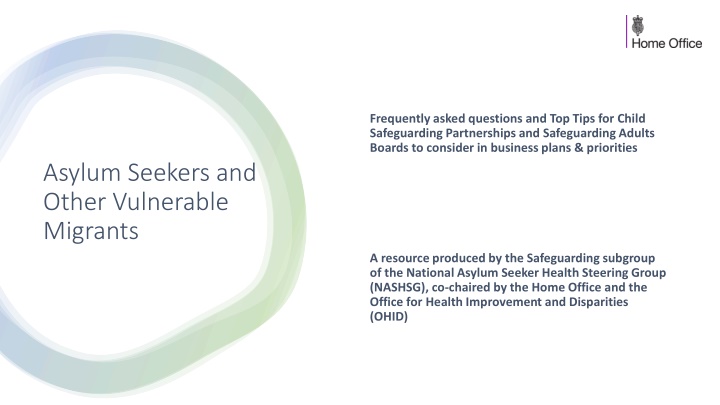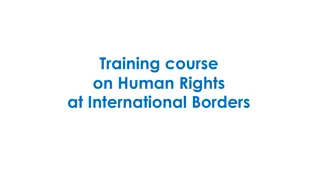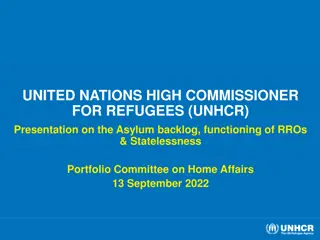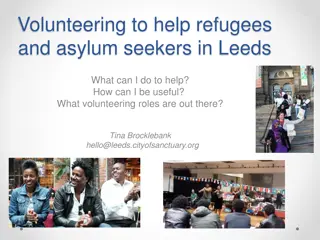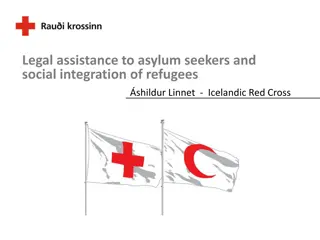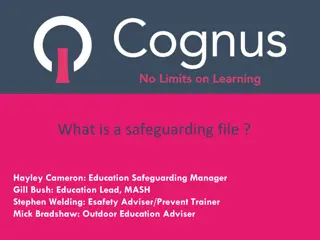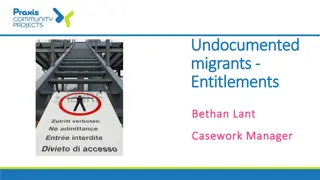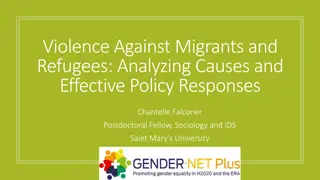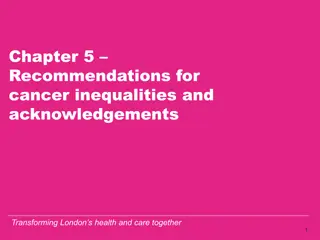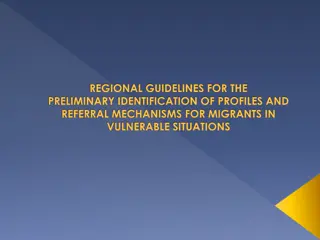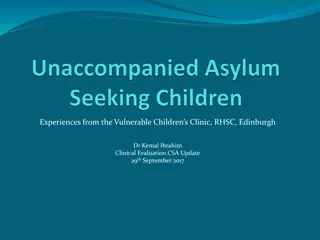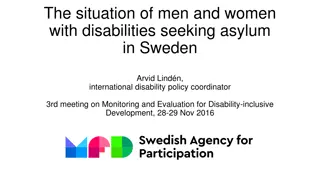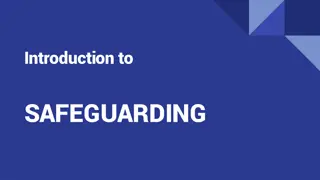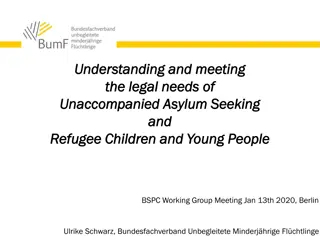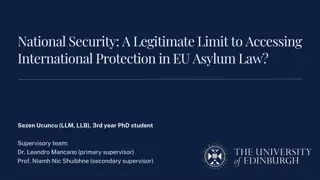Safeguarding Tips for Asylum Seekers and Vulnerable Migrants
COVID-19 impact on asylum applications, vulnerable migrants, refugee status, and safeguarding measures discussed in a resource by NASHSG subgroups under Home Office and OHID co-chairship. Focus on accommodation challenges, legal definitions, and safeguarding responsibilities.
Download Presentation

Please find below an Image/Link to download the presentation.
The content on the website is provided AS IS for your information and personal use only. It may not be sold, licensed, or shared on other websites without obtaining consent from the author.If you encounter any issues during the download, it is possible that the publisher has removed the file from their server.
You are allowed to download the files provided on this website for personal or commercial use, subject to the condition that they are used lawfully. All files are the property of their respective owners.
The content on the website is provided AS IS for your information and personal use only. It may not be sold, licensed, or shared on other websites without obtaining consent from the author.
E N D
Presentation Transcript
Frequently asked questions and Top Tips for Child Safeguarding Partnerships and Safeguarding Adults Boards to consider in business plans & priorities Asylum Seekers and Other Vulnerable Migrants A resource produced by the Safeguarding subgroup of the National Asylum Seeker Health Steering Group (NASHSG), co-chaired by the Home Office and the Office for Health Improvement and Disparities (OHID)
Introduction The COVID-19 Pandemic caused a slowing of asylum applications in the usual pre-pandemic way, whilst large numbers of arrivals continued As a result accommodation became gridlocked The Home Office procured a large number of hotels as contingency accommodation across the UK often being rapidly stood-up to accommodate people, after having crossed the Channel by small boats, spending upwards of 6 hours at sea The Safeguarding Adults National Network (SANN) commissioned a paper as a result of increasing concerns for wellbeing of asylum seekers. This was presented at several forums, including the National Safeguarding Steering Group, who supported the recommendation for the establishment of the National Asylum Seeker Health Steering Group (NASHSG) This resulted in a multi-agency group, co-chaired by the Home Office and the Office for Health Improvement and Disparities (OHID), with sub-groups developing to look at different needs of asylum seekers This pack was developed by the safeguarding subgroup of the NASHSG
Asylum seeker Person who has departed their country of origin and officially applied for asylum in another country but is awaiting a decision on their request for refugee status Vulnerable migrants Refugee A person who owing to a well-founded fear of being persecuted for reasons of race, religion, nationality, membership of a particular social group, or political opinion, is outside the country of his nationality, and is unable to or, owing to such fear, is unwilling to avail himself of the protection of that country 1951 Refugee Convention (Geneva UNHCR - The 1951 Refugee Convention) - Refugees can be resettled to the UK via the Mandate Scheme, the UK Resettlement Scheme (UKRS) Community Sponsorship Scheme Afghan Relocation and Assistance Policy (ARAP) and the Afghan Citizens Resettlement Scheme (ACRS). Undocumented migrant Undocumented migrants may have entered the UK legally but have lost their right of residence or entered the UK illegally and do not have the right of residence. Vulnerable migrants Can include: People seeking asylum; refugees; unaccompanied children; people who have been trafficked; undocumented migrants; low paid migrant workers Whilst legal status differs between groups, statutory safeguarding applies equally
Initial Contingency Accommodation (IA) Accommodation Terminology The Home Office has a statutory obligation to provide support including accommodation to destitute asylum seekers whilst their claims are being considered. This is used in the form of hotels managed by Home Office commissioned providers - used to house either single adults or families with children. People are sometimes moved at short notice. Dispersal Accommodation Longer-term temporary accommodation managed by accommodation providers on behalf of the Home Office. People and families will be able to stay in dispersal accommodation until their asylum claim has been fully determined. It is not always possible to stay in the same property and people will often move around the country.
Frequently Asked Questions about Home Office Asylum Accommodation and Support Contracts (AASC) for Asylum Seekers and Other Vulnerable Migrants
What are the staffing arrangements and governance structures within the hotels including safeguarding leads/dispersal accommodation? Hotels/Initial Accommodation Centres (IACs) may have staff employed by the hotel, staff employed by the accommodation provider and/or a sub-contractor as well as security and healthcare staff. The hotel staff will ensure that the fabric of the building is maintained and ancillary services such as housekeeping, maintenance and reception are provided. The sub-contractor staff will carry out face to face interactions with the service users including support with GP and school registration, welfare checks and periodic room inspections as well are raising Safeguarding and Incident Reports. The accommodation provider will have a team of Safeguarding or Welfare Officers who will support the service users with any safeguarding issues and will make all external referrals following both Local and National Referral Pathways. In Dispersal Accommodation, The accommodation providers will have Housing/Welfare Officers attending the property each month to carry out property inspections and to carry out welfare checks. The result of which may require a Safeguarding Referrals or Incident Report to be raised. The Home Office Asylum Safeguarding Hub is contactable at AsylumSafeguarding@homeoffice.gov.uk.
What safeguarding training are the staff in the accommodation required to undertake and who provides it? The Minimum Training Standards for accommodation providers can be found on Page 7 of the AASC Statement of Requirements at Section 1.2.4. Accommodation providers are contractually obliged to ensure that all staff employed on the AASC Contract undergo Training on Safeguarding Children and Safeguarding Adults. This includes Sub-Contracted Staff. Training is provided by a reputable provider and reviewed on an annual basis.
How are safeguarding concerns (including Prevent) in the accommodation settings raised both internally and externally? The accommodation providers have their own safeguarding processes which are required as part of the contract with the Home Office. These processes are monitored via the regular Asylum Support Contract Senior Safeguarding Boards. How do the providers ensure staff understand local referral pathways? The accommodation providers will link with Adult and Children s services at place to ensure local referral pathways are shared. The accommodation providers will have established links identifying the Prevent pathway within the region, ensuring staff are aware of the pathway. The accommodation providers will have internal safeguarding and Prevent escalation routes as per their training.
What do accommodation providers deliver and how do you link with local services, including health and social care and community resources? Each Local Authority, Health Board and CCG /Integrated Care Boards (ICBs) who will have their own processes that the accommodation provider will endeavour to dovetail into. During the initial phase, accommodation providers will set up regular operational/partnership meetings, including local authorities; CCGs/ICBs; VCS; emergency services and any other relevant parties. The accommodation provider will support and encourage links with all statutory services.
How do the accommodation providers respond if a person in accommodation reports to be under 18? The accommodation providers comply with the Home Office Standard Operating Procedures on Age Assessments When a service user states that they are a minor. If the report is made to the accommodation providers, they make an enquiry of the Home Office Safeguarding Hub on any previous age assessments. If the service user has already been age assessed as an adult and the service user is disputing this, they are signposted and supported to speak to their legal representative. If the service user has not previously been age assessed and claims to be a minor, the accommodation provider will make a referral to Children's Services. If the service user makes a referral to any external agency, they should refer to Children's Services and they should contact the Home Office as per an agreed protocol.
How are the needs and wellbeing of Unaccompanied Asylum Seeking Children (UASC) met by accommodation providers and how are they safeguarded? The accommodation providers do not accommodate UASC under the AASC Contract. In situations where an Age Assessment Referral has been made to a Local Authority, the accommodation providers will undertake more frequent welfare checks whilst the service user is in our accommodation. Once the Local Authority has met the service user, one of three things will happen: The LA will agree that the service user is a minor, and will then accommodate them as a UASC The LA will agree that a Merton Compliant Age Assessment (R (B) v Merton [2003] EWHC 1689 (Admin) where the High Court set down broad guideleines on how age assessments should be conducted where unaccompanied minors are or report to be under 18) needs to be undertaken and at that point the service user should be accommodated as a Looked After Child during the Merton Compliant Age Assessment. The service user will then be taken from Home Office Accommodation and accommodated by the Local Authority The LA assess that the service user is not a minor, and will then remain accommodated by the Home Office
Are all staff in the accommodation settings DBS checked including those sub-contracted? All accommodation providers and sub-contracted staff will undergo minimum of Enhanced DBS Checking More senior management roles may undergo Counter Terrorism Check (CTC) or Security Clearance (SC) Vetting
How is risk assessed and managed within the accommodation settings? Risk Assessments are carried out for specific risks, concerns and issues. Copies of the Risk Assessment Register are available as required from the accommodation provider via their Safeguarding Lead.
How are allegations against staff working with asylum seekers in the accommodation raised and managed? Allegations of this nature can be raised via the Advice, Issue Reporting and Eligibility (AIRE) provider Migrant Help, The Home Office or directly with the accommodation provider. All allegations against staff are taken extremely seriously. The nature of the allegation may require suspension from duty, Police Reports and referrals to the LA LADO and procedures to manage allegations about staff who work with adults at risk. Referrals to support and safeguard the service user will also be made. Each case of allegation is assessed on a case by case basis, the Home Office are informed and the appropriate actions are taken to safeguard the service user and to allow for the prompt and efficient investigation of the allegations raised
What are accommodation provider policy and procedures for missing/absent people (including UASC/under 18s) and how do they link with partner agencies to ensure exploitation/re-trafficking risks are managed? When service users leave the accommodation without notice or the authorisation of the Home Office or accommodation provider, they will be reported as Absent to the Home Office. The Home Office will endeavour to make contact with the service user including via their legal representative. If the absent service users have any noted safeguarding issues or vulnerabilities, a Missing Persons Report will be made to the Police Force in the area they were last accommodated. If a Missing Person s Report is made to the Police, referrals may also be made to the Local Authority or health teams. Accommodation Providers will signpost to relevant agencies, where appropriate, to encourage service users to seek support in regard to modern slavery, re-trafficking or exploitation. Accommodation Providers will also submit incident reports to the Home Office identifying any concerns/issues or information relating to the service user.
Top Tips for Safeguarding Adults Boards and Safeguarding Children Partnerships considering the needs of asylum seekers and other migrants
Top Tips for Boards/Partnerships to consider as areas for self assessment and/or challenge to partner agencies Do your kinship care/private fostering policies and procedures have an asylum/forced migration lens? Make sure that the your partnership has assured that all partner agencies are aware that in forced migration situations, children who have arrived accompanied, may not always be with parents or family members. This may not become apparent initially and disclosure may take time due to trauma. Children may have been passed to others fleeing an area, or they may have become separated from family or orphaned during their journey. Are your teams cognisant of the potential for adultification of UASC or accompanied children ? Adultification bias within child protection and safeguarding (justiceinspectorates.gov.uk) Page 7 Asylum seeking children may appear to be or act older than they are. They are sometimes wrongly perceived to be more streetwise and/or resilient than they really are because of their journey and experiences
Do your partnership business plans include the particular vulnerabilities of asylum seekers and other forced migrants? For example: Communication barriers; language, literacy or sensory impairment Impact of disability Impact of trauma Cultural awareness Experiencing and witnessing significant and prolonged violence and sexual violence (both females and males). Forced migration, sexual and gender-based violence and health: findings from the SEREDA project in the UK (birmingham.ac.uk) No recourse to Public Funds (NRPF), homelessness, frequent or sudden moves Does your partnership access and review data on asylum seekers and other forced migrant populations in relation to safeguarding and/or care and support needs? Risk of being trafficked and enslaved (debt bondage)/exploitation Children separated from parents/family member (see previous slide)
Key Areas for Safeguarding Adults Boards and Childrens Safeguarding Partnerships to Consider How are your operational safeguarding teams and those of partner agencies supported to understand the needs of asylum seekers/forced migrants ? (consider contacting the Home Office for access to Asylum Seekers Journey Training). What are your local information sharing/partnership working policies to support this type of vulnerability? Do your partner organisations have the appropriate contacts within the provider accommodation organisations? Do you have arrangements to include, as appropriate, accommodation providers in safeguarding enquiries for adults and/or children (consider clarifying MASH/Front Door arrangements and ensuring Chapter 1.78 of Working Together 2018 is adhered to)? What are the arrangements for ensuring health needs are met and how are your health partners engaging with the accommodation providers? What are the arrangements for ensuring care and support needs are met?
How are your local key safeguarding risks in your Partnership area considered in relation to asylum seekers and other vulnerable migrants? How do you ensure learning from statutory reviews in relation to asylum seekers/forced migrants is applied in your area? Access to learning from reviews can be gained from: Safeguarding Adults Reviews library now held by the National Network for SAB Chairs https://nationalnetwork.org.uk Case reviews | NSPCC Learning Do you have local audit processes to ensure partner agencies are able to safely meet the needs of forced migrants, including those in the asylum process? Are your safeguarding promotional materials available in a variety of languages and easy-read versions? How is safeguarding information and advice communicated to the accommodation providers and who by? How do your partner agencies disseminate information relating to asylum seeker accommodation types in your area and how do you ensure that strategic and operational staff are briefed?
Doctors of The World UK : support and Guidance for healthcare partners including Primary Care Doctors of the World - Doctors of the World Migrant Help (migranthelpuk.org) Refugee Council Homepage - Refugee Council NRPF Network Social care | NRPF (nrpfnetwork.org.uk) British Medical Association Toolkit Refugee and asylum seeker health toolkit (bma.org.uk) Helen Bamber Foundation Helen Bamber Foundation | Strength to Fly Migrant Child Health https://www.gov.uk/guidance/childrens- health-migrant-health-guide Slavery and Trafficking https://www.gov.uk/government/collections/modern-slavery Migrant Health Guide https://www.gov.uk/government/collections/migrant-health- guide UASC health https://www.uaschealth.org/ Good Practice in Social Care for Refugees and Asylum Seekers Good practice in social care for refugees and asylum seekers - Home (scie.org.uk) Additional Resources
